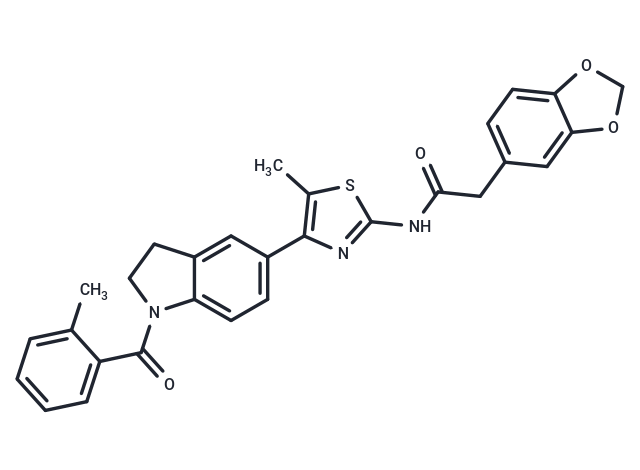Shopping Cart
- Remove All
 Your shopping cart is currently empty
Your shopping cart is currently empty

ML385 is an NRF2 inhibitor (IC50=1.9 μM) with novelty and specificity. ML385 has anti-inflammatory activity by modulating anti-oxidative stress through the inhibition of NRF2. ML385 also exhibits anti-tumor activity.

| Pack Size | Price | Availability | Quantity |
|---|---|---|---|
| 5 mg | $47 | In Stock | |
| 10 mg | $72 | In Stock | |
| 25 mg | $155 | In Stock | |
| 50 mg | $255 | In Stock | |
| 100 mg | $396 | In Stock | |
| 200 mg | $592 | In Stock | |
| 500 mg | $947 | In Stock | |
| 1 mL x 10 mM (in DMSO) | $54 | In Stock |
| Description | ML385 is an NRF2 inhibitor (IC50=1.9 μM) with novelty and specificity. ML385 has anti-inflammatory activity by modulating anti-oxidative stress through the inhibition of NRF2. ML385 also exhibits anti-tumor activity. |
| Targets&IC50 | Nrf2:1.9 μM |
| In vitro | METHODS: Human lung cancer cells A549 were treated with ML385 (0.25-5 μM) for 12-72 h. The expression levels of target genes were detected by RT-qPCR. RESULTS: ML385 dose-dependently and time-dependently decreased the transcriptional activity of NRF2. [1] METHODS: Human lung cancer cells EBC1 were treated with ML385 (1-25 μM) for 48 h, and the expression levels of target proteins were detected by Western Blot. RESULTS: NRF2 expression was inhibited by treatment with 5 μM ML385. When the concentration of ML385 was increased above 5 μM, the NRF2 protein level was restored. [2] |
| In vivo | METHODS: To detect anti-tumor activity in vivo, ML385 (30 mg/kg) and carboplatin (5 mg/kg) were intraperitoneally injected into athymic nude mice harboring human lung cancer tumors A549 or H460 five times a week for three weeks. RESULTS: Treatment with ML385 in combination with carboplatin showed a significant reduction in tumor growth. Although treatment with a single agent resulted in a reduction in tumor growth, the magnitude of these effects was variable between cell lines and did not reach statistical significance. [1] METHODS: To investigate whether Nrf2 modulates acute liver failure (ACLF) through iron death, ML385 (30 mg/kg) was injected intraperitoneally four times per week for four weeks into BALB/c mice constructed in the ACLF model. RESULTS: More severe histopathological lesions were observed in the ML385 group compared to the ACLF group. lipid peroxidation and liver injury were exacerbated by the Nrf2 inhibitor, ML385. [3] |
| Cell Research | cells are treated with ML385 for 36 h. An equal amount of CellTiter-Blue reagent is added to the wells and the fluorescence is measured after 30 min. The CellTiter-Blue reagent is discarded and the Caspase-Glo (100 μL) reagent is added to the cells and incubated at 37°C for an additional 60-90 min. The resulting luminescence is recorded and the caspase activity is normalized to cell number |
| Animal Research | Mice tumor xenografts are administered intraperitoneally ML385 (30 mg/kg). |
| Molecular Weight | 511.59 |
| Formula | C29H25N3O4S |
| Cas No. | 846557-71-9 |
| Smiles | Cc1sc(NC(=O)Cc2ccc3OCOc3c2)nc1-c1ccc2N(CCc2c1)C(=O)c1ccccc1C |
| Relative Density. | 1.374 g/cm3 (Predicted) |
| Storage | keep away from moisture | Powder: -20°C for 3 years | In solvent: -80°C for 1 year | Shipping with blue ice. | ||||||||||||||||||||
| Solubility Information | DMSO: 50 mg/mL (97.73 mM), Sonication is recommended. 10% DMSO+40% PEG300+5% Tween 80+45% Saline: 3 mg/mL (5.86 mM), suspension.In vivo: Please add the solvents sequentially, clarifying the solution as much as possible before adding the next one. Dissolve by heating and/or sonication if necessary. Working solution is recommended to be prepared and used immediately. | ||||||||||||||||||||
Solution Preparation Table | |||||||||||||||||||||
DMSO
| |||||||||||||||||||||

Copyright © 2015-2025 TargetMol Chemicals Inc. All Rights Reserved.